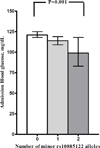Alpha2A adrenergic receptor genetic variation contributes to hyperglycemia after myocardial infarction
- PMID: 27131769
- PMCID: PMC4879094
- DOI: 10.1016/j.ijcard.2016.04.079
Alpha2A adrenergic receptor genetic variation contributes to hyperglycemia after myocardial infarction
Abstract
Background: Acute myocardial infarction (AMI) is frequently associated with transient hyperglycemia even in patients without pre-existing diabetes. Acute stress can lead to increased blood glucose through the effect of catecholamines on alpha2A-adrenergic receptors (α2A-ARs) present in pancreatic islet β-cells. Variation in the gene (ADRA2A) that encodes the α2A-AR affects insulin release and glucose control and may play a particularly important role during times of stress.
Methods: We performed a retrospective cohort study using de-identified electronic medical records linked to a DNA repository in 521 Caucasians and 55 African-American non-diabetic patients with AMI. We examined the association between admission blood glucose concentrations and ten selected ADRA2A SNPs in Caucasians.
Results: Three ADRA2A SNPS were associated with stress-induced hyperglycemia in Caucasians. Individuals homozygous for the rs10885122 variant (n=9) had a 23% lower admission glucose (geometric mean [95% CI], 99 [83-118]mg/dl) compared with non-carriers (121 [118-125] mg/dl; n=401; P=0.001). Admission glucose was 14% higher in rs1800544 variant homozygotes (134 [119-150]mg/dl; n=36) compared to non-carriers (118 [115-121]mg/dl; n=290, P=0.046). Furthermore, homozygotes of the rs553668 variant (n=13) had a 13% higher glucose (133 [110-160]mg/dl) compared to non-carriers (118 [115-122]mg/dl; n=366; P=0.056). Haplotypes including these ADRA2A SNPs were associated with higher admission glucose levels.
Conclusions: Three ADRA2A genetic variants are associated with blood glucose and stress-induced hyperglycemia after AMI in Caucasians.
Keywords: Alpha adrenergic receptors; Glucose; Stress.
Copyright © 2016 Elsevier Ireland Ltd. All rights reserved.
Figures
References
-
- Bronisz A, Kozinski M, Magielski P, et al. Stress hyperglycaemia in patients with first myocardial infarction. Int J Clin Pract. 2012;66(6):592–601. - PubMed
-
- Capes SE, Hunt D, Malmberg K, Pathak P, Gerstein HC. Stress hyperglycemia and prognosis of stroke in nondiabetic and diabetic patients: a systematic overview. Stroke. 2001;32(10):2426–2432. - PubMed
-
- Kerby JD, Griffin RL, MacLennan P, Rue LW., 3rd Stress-induced hyperglycemia, not diabetic hyperglycemia, is associated with higher mortality in trauma. Ann Surg. 2012;256(3):446–452. - PubMed
-
- Zhang JW, Zhou YJ, Cao SJ, Yang Q, Yang SW, Nie B. Impact of stress hyperglycemia on in-hospital stent thrombosis and prognosis in nondiabetic patients with ST-segment elevation myocardial infarction undergoing a primary percutaneous coronary intervention. Coron Artery Dis. 2013;24(5):352–356. - PubMed
-
- Schuetz P, Kennedy M, Lucas JM, et al. Initial management of septic patients with hyperglycemia in the noncritical care inpatient setting. Am J Med. 2012;125(7):670–678. - PubMed
MeSH terms
Substances
Grants and funding
LinkOut - more resources
Full Text Sources
Other Literature Sources
Medical
Research Materials



